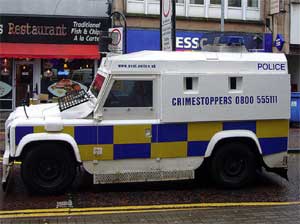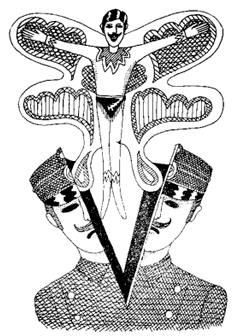Over 30 years of anarchist writing from Ireland listed under hundreds of topics
Loyalism
WSM twitter live during Ardoyne Orange Order July 12th parade
It is this time of year again when the spectre of sectarianism and division comes to the fore in the north of Ireland. It is a time when communities, kerbstones and poles are marked and carved into territory. There are those who will be living in fear and silenced from speaking out while the rest of us are told to turn the other check in the interests of peace and stability. It is unfortunate, if perhaps somewhat inevitable, that the now annual battles around the ‘marching season’ fall along religious lines. The Orange parades are being used to test the supposed 'neutrality' of the northern regime and the PSNI in particular. The losing side in this dangerous game however is likely to be the working class, as the confrontations and the sectarian attacks that occur around the Orange marches drive people further into ‘their own’ communities.
Survey shows 66% of young in north neither unionist nor nationalist
The latest survey from Northern Ireland Life and Times highlights that just over half of those questioned are dissatisfied with the devolved government with most respondents believing more should be done to tackle unemployment and poverty. Social issues appear to be of more concern to those 1205 adults questioned across all walks of life in the North than 'the national question', and 45% of those polled do not consider themselves nationalist or unionist. This deviation from expectations is very strong with the young, 66% of those aged 18-24 considered themselves neither nationalist nor unionist.
Sectarian violence on the streets of East Belfast
 The cracks beneath the surface in the peace process were once again exposed on the streets of East Belfast last night in the second night of serious sectarian rioting. A UVF led mob numbering in the 100's has been engaged in attacks on catholic homes at the edge of the Short Strand. This is the reality of a peace dividend which has failed to deliver to working-class communities and stands in stark contrast to suburbia only 5 miles away which produced golf champion Rory McElroy.
The cracks beneath the surface in the peace process were once again exposed on the streets of East Belfast last night in the second night of serious sectarian rioting. A UVF led mob numbering in the 100's has been engaged in attacks on catholic homes at the edge of the Short Strand. This is the reality of a peace dividend which has failed to deliver to working-class communities and stands in stark contrast to suburbia only 5 miles away which produced golf champion Rory McElroy.
The Belfast police mutiny of 1907
 During the 1907 Dock strike in Belfast there was a police mutiny involving 70% of the Belfast police. In this article John Gray argues that "When we look at the 1907 Dock Strike in Belfast and the police mutiny of the same year simple myths begin to evaporate. We find unskilled workers, mainly Protestant, fighting the employers, many their future leaders in the UVF, we find policemen, many Protestant, mutinying, we find the Independent Orangemen mustering hundreds of Protestant workers under a platform asking Protestants as Irishmen to play their part in the development of Ireland as a nation." The article is from Anarchy No 6, published in London in 1970
During the 1907 Dock strike in Belfast there was a police mutiny involving 70% of the Belfast police. In this article John Gray argues that "When we look at the 1907 Dock Strike in Belfast and the police mutiny of the same year simple myths begin to evaporate. We find unskilled workers, mainly Protestant, fighting the employers, many their future leaders in the UVF, we find policemen, many Protestant, mutinying, we find the Independent Orangemen mustering hundreds of Protestant workers under a platform asking Protestants as Irishmen to play their part in the development of Ireland as a nation." The article is from Anarchy No 6, published in London in 1970
The politics of class and sectarianism in Belfast and rest of UK in the early 20th century
During industrialisation, the northeast became an integral part of the British industrial output centred on the industrial triangle of Belfast, Merseyside and Glasgow. ‘Free trade’(heavily subsidised by the state of course) underpinned the empire and access to overseas markets were essential to the economy of Belfast and its periphery.
Fighting racism and the rise of the far-right in the North
The recent attacks in South Belfast in which over a 100 Romanian families were forced to flee the North should serve as a wake up to everyone. Racism is not a new phenomum in the North, nor is it confined to one section of the community or social class, or cannot be simply reduced to economic factors. The rise of the far right in countries such as Hungary and Italy and the breakthrough of the British National Party (BNP) in the recent EU elections have only compounded fears and anxiety.
A personal account of the annual Orange Order parades from Belfast to Bangor
After hearing about Slugger O’Toole’s day in the Orange, I jumped at the chance of finding out more about this annual event which brings hundreds of thousands onto the streets across Northern Ireland. As the day progressed I was converged with a mixture of emotions, soon drained away by tiredness and an element of boredom.
Sectarian murder in Coleraine
The brutal sectarian murder of voluntary community worker Kevin McDaid in Coleraine has again exposed the ugly face of sectarianism in Northern Ireland and the fallacy of the so-called peace settlement.
The Spirit of 1968 - Lessons from the Northern Ireland Civil Rights Movement
 AS we continue to bear the brunt of the recession and our politicians stabilise the interests of the rich and fat cats, the 1960s provides us with an example in the necessity for struggle and social revolution. Sinn Fein and the Social Democratic and Labour Party, pillars of the establishment continue to squabble over the legacy of the Civil Rights Movement they all share one thing in common when it comes to defending the status-quo and attacks on workers rights and conditions.
AS we continue to bear the brunt of the recession and our politicians stabilise the interests of the rich and fat cats, the 1960s provides us with an example in the necessity for struggle and social revolution. Sinn Fein and the Social Democratic and Labour Party, pillars of the establishment continue to squabble over the legacy of the Civil Rights Movement they all share one thing in common when it comes to defending the status-quo and attacks on workers rights and conditions.
The 1907 Belfast strike
In 1907 Belfast saw the first big battle between the working and employing classes in Ireland. The dockers' and carters' strike was the spark which lit a fire of working class militancy. Workers were flexing their muscle, Catholic and Protestant were uniting, 'Larkinism' was giving the bosses nightmares. Even the police got caught up in the new mood and mutinied.

